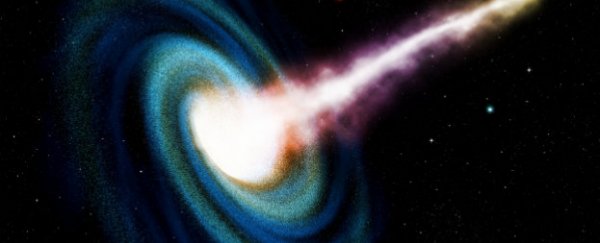As galaxies mature, at some point they stop producing new stars. Astronomers have been searching for the reason behind this, and a new study has shed some light on the mystery.
Stars are formed when hot gas is sucked towards a galaxy's black hole, which causes gas to cool down and condense. Eventually, the central black hole of the galaxy is so massive that it can't cool any more gas to form stars, and the galaxy becomes "matured".
Why this happens has puzzled scientists, until now. A new study published in the journal Monthly Notices of the Royal Astronomical Society has found that supermassive black holes emit radio-frequency feedback - particles that shoot out when matter falls into the surrounding environment of a black hole. This radio-frequency feedback appears to heat up the interstellar gas, preventing it from cooling, clumping and forming new stars.
The researchers from John Hopkins University in the US, used a unique method to study the process. Called the Sunyaev-Zel'dovich (SV) effect, the method is usually used to study how the earliest cosmic background radiation interacts with the electrons inside matter trapped in hundreds of galaxies - but in this research, the scientists used it to study a single mature galaxy.
"The SZ is usually used to study clusters of hundreds of galaxies but the galaxies we're looking for are much smaller and have just a companion or two," said Megan Gralla, author of the study in a press release.
In their study, they stumbled upon supermassive black holes that were shooting out radio-frequency feedback particles at the speed of light. The emitted feedback contained hot gas and lacked infant stars, proving that this was the mechanism that caused mature galaxies to "switch off" star formation.
"We're using a technique that's been around for some time and that researchers have been very successful with, and we're using it to answer a totally different question [why do galaxies stop producing stars?] in a totally different subfield of astronomy," said Grailia.
This is the first time that the SV effect has been used to study the environment of a single galaxy, giving astronomers new insights into the environment of a matured galaxy.
The team remain unsure of what causes the black holes in mature galaxies to emit this feedback that blocks star formation, but the study has gathered new data about the amount of hot gas in galaxies.
"I was stunned when I saw this paper, because I've never thought that detecting the SZ effect from active galactic nuclei was possible," said Eiichiro Komatsu, director of the Max Planck Institute for Astrophysics in Germany who wasn't involved in the research, in a press release. "Research on the SZ effect has entered a new era."
Source: EurekAlert
